Bisphosphonate & Calcium Timing Calculator
Your bisphosphonate needs to be taken on an empty stomach with plain water to absorb properly. Taking calcium too close together can reduce absorption by up to 90%. This tool helps you calculate the correct timing.
Why Your Bisphosphonate Might Not Be Working
You’re taking your bisphosphonate every morning like your doctor told you. You’re also taking your calcium supplement-because everyone says it’s good for your bones. But your bone density isn’t improving. Your doctor says your levels are still low. What’s going on?
The answer is simple: calcium is blocking your bisphosphonate from being absorbed.
It’s not that the medicine is broken. It’s not that you’re doing anything wrong on purpose. It’s that the two substances-calcium and bisphosphonates-literally bind to each other in your stomach like magnets. Once they stick together, your body can’t absorb either one properly. And if your bisphosphonate doesn’t get absorbed, it can’t do its job: slowing bone loss and reducing fracture risk.
Studies show that taking calcium at the same time as your bisphosphonate cuts absorption by 90-100%. That means you might as well be swallowing a sugar pill. And you’re not alone. Around half of all patients taking oral bisphosphonates like alendronate or risedronate mess up the timing. Many don’t even know they’re doing it.
How Bisphosphonates Actually Work
Bisphosphonates-drugs like alendronate (Fosamax), risedronate (Actonel), and zoledronic acid (Reclast)-were designed to stick to bone. Their chemical structure has two phosphate groups that latch onto calcium crystals in your skeleton. That’s not a bug; it’s the whole point.
Once they’re stuck to bone, they go to work on osteoclasts-the cells that break down old bone. These drugs shut down the osteoclasts’ energy supply, essentially starving them. As a result, bone breakdown slows, and your bones get stronger over time.
But here’s the catch: bisphosphonates can only do this if they get into your bloodstream first. And for oral versions, that means they have to pass through your gut. Unfortunately, your gut doesn’t want to let them through. They’re poorly absorbed-less than 1% of the pill makes it into your blood under perfect conditions.
That tiny percentage? It’s already fighting an uphill battle. Add calcium, iron, antacids, coffee, or even mineral water, and that number drops to nearly zero.
The Calcium Problem: Why It’s Worse Than You Think
Calcium supplements are essential for bone health. But they’re also the #1 reason bisphosphonates fail.
Calcium carbonate and calcium citrate-the two most common forms-both interfere. It doesn’t matter if it’s a 500 mg tablet, a chewable, or a liquid. As soon as calcium hits your stomach alongside a bisphosphonate, they form a tight, insoluble complex. Your body can’t break it down. The bisphosphonate just passes through, useless.
Even worse, this isn’t just about timing. It’s about what else you’re eating. A bowl of cereal with milk, a yogurt, a multivitamin with iron, or even a glass of fortified orange juice can ruin absorption. That’s why the rules are so strict: take your bisphosphonate on an empty stomach, with plain water only.
One study found that patients who took their bisphosphonate with breakfast had 98.7% less drug in their blood compared to those who followed the protocol. That’s not a small difference-it’s the difference between treatment and no treatment.
How to Take Bisphosphonates Correctly
There’s a proven, simple routine. Do this every single time:
- Take your bisphosphonate first thing in the morning, before eating or drinking anything else.
- Swallow it with a full glass (6-8 oz) of plain tap water. No sparkling, no mineral, no coffee, no tea.
- Stay upright-standing or sitting-for at least 30 minutes. Don’t lie down. Don’t bend over. This prevents the pill from irritating your esophagus.
- Wait at least 30-60 minutes before eating, drinking anything else, or taking any other medication-including calcium.
- Take your calcium supplement later in the day, ideally at lunch or dinner.
That’s it. No magic. No complicated charts. Just timing.
Many patients find it easiest to take their bisphosphonate at 5:00 a.m. and their calcium at 6:30 a.m. That way, they’re awake, they’ve had a chance to get up, and they’ve cleared the window before breakfast. Others take it at 7:00 a.m. and wait until 8:00 a.m. for their supplement. The key isn’t the exact time-it’s the gap.

What About Intravenous Bisphosphonates?
If you’ve struggled with the timing for months-or if you’ve forgotten your dose too many times-there’s another option: the IV shot.
Zoledronic acid (Reclast) is given once a year as a 15-minute infusion. No fasting. No water rules. No calcium conflicts. It goes straight into your bloodstream. Absorption? 100%.
It’s not for everyone. You need to be able to get to a clinic. You need to be okay with a needle. And it can cause flu-like symptoms the next day for some people. But for those who can’t stick to the oral routine? It’s a game-changer.
Studies show that adherence jumps from 52% with daily oral pills to 78% with yearly IV infusions. That’s not just convenience-it’s better outcomes.
What About Vitamin D?
You can’t fix calcium absorption if you’re low on vitamin D. And you can’t fix bisphosphonate effectiveness if your body can’t use the calcium you’re taking.
Doctors now check your vitamin D level before starting bisphosphonates. The target? At least 30 ng/mL. If you’re below that, you’ll be prescribed a high-dose supplement for a few weeks first.
Without enough vitamin D, even perfectly timed calcium won’t help. Your bones won’t mineralize properly. And you might even develop low blood calcium-something that can cause muscle cramps, numbness, or even heart rhythm issues.
So don’t skip the blood test. And don’t assume your daily multivitamin is enough. Most contain only 400-800 IU of vitamin D. Many patients need 1,000-2,000 IU daily to reach optimal levels.
Real People, Real Mistakes
On patient forums, the stories are everywhere:
- “I took my Fosamax with my morning coffee and yogurt. I didn’t think it mattered.”
- “I forgot and took my calcium at breakfast. I’ve been doing that for 3 years.”
- “I take my pill at night because I forget in the morning. I thought that was fine.”
None of these work.
One woman in Perth, 72, told her pharmacist she’d been taking alendronate for five years and still fractured her wrist. She was taking it at 10 p.m. with her nightly calcium tablet. Her doctor switched her to yearly zoledronic acid. No more timing issues. No more fractures.
Another man, 68, used a smartphone alarm to remind him to take his pill. But he also set a second alarm for his calcium. He thought 30 minutes was enough. He didn’t realize he was still eating toast with jam and butter during that window. He switched to IV treatment after his second hip fracture.
The common thread? They all thought they were doing the right thing. They just didn’t know how strict the rules were.
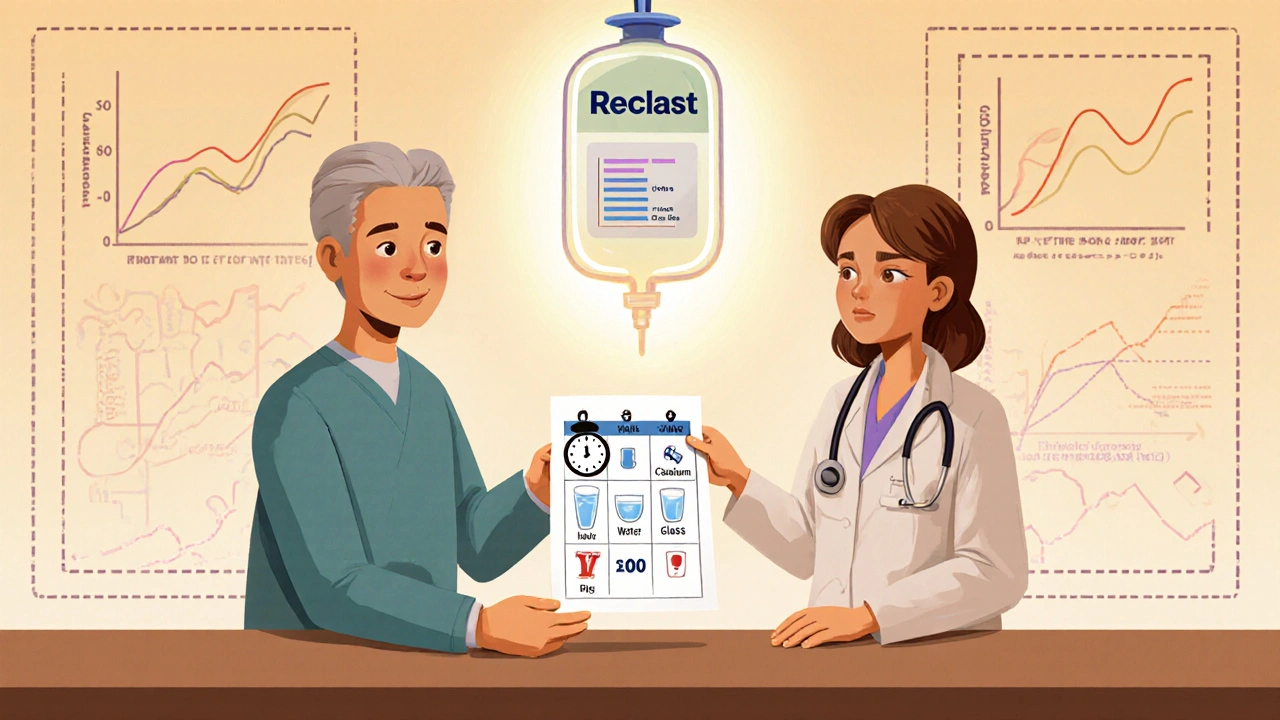
What If You Messed Up?
Accidentally took your calcium with your bisphosphonate? Don’t panic. Don’t double-dose. Just wait.
If you realize within 30 minutes, skip the dose for that day. Don’t take it later. Don’t try to make up for it. The next day, go back to the correct routine.
If you realize hours later-say, you took them together at breakfast-you’ve already lost the absorption. Skip your next dose too. Wait until the following day to restart properly.
Never take two doses close together. It won’t make up for the missed absorption. It just increases your risk of stomach upset or esophageal irritation.
Alternatives If You Can’t Stick to the Rules
If the timing feels impossible, you’re not failing. The system is just outdated.
There are newer drugs that don’t require fasting or timing:
- Denosumab (Prolia): Injected every 6 months. No food restrictions. Works differently-targets a different bone cell pathway.
- Romosozumab (Evenity): Monthly injections for 12 months. Builds bone faster than bisphosphonates. Higher cost, but better adherence.
These aren’t perfect. They’re more expensive. They require clinic visits. But if you’ve tried and failed with bisphosphonates, they’re worth discussing.
And here’s the good news: the next generation of bisphosphonates is coming. A new oral form of zoledronate, currently in trials, uses a special coating that lets it absorb even with food. Early results show 15 times better absorption than current pills. It’s not on the market yet-but it’s coming.
Final Advice: Talk to Your Pharmacist
Your doctor might not have time to walk you through the timing. But your pharmacist does.
Pharmacists are trained to spot these errors. They can give you a printed schedule. They can help you set up phone reminders. They can even write down your exact dosing plan: “Take bisphosphonate at 6 a.m. with water. Wait until 7 a.m. to eat or take calcium.”
And if you’re still confused? Ask for a medication review. Many pharmacies offer this for free. They’ll check all your pills, all your supplements, and tell you exactly what conflicts exist.
Because this isn’t about being perfect. It’s about being smart. And the smartest thing you can do is get help before your next fracture.
Can I take calcium and bisphosphonates on the same day?
Yes, but not at the same time. You must separate them by at least 30-60 minutes. Take your bisphosphonate first, on an empty stomach, with plain water. Wait the full time before eating or taking calcium. Taking them together cancels out the effectiveness of the bisphosphonate.
Does it matter what type of calcium I take?
Calcium citrate is absorbed better than calcium carbonate, especially if you take it with food. But when it comes to bisphosphonates, both forms block absorption equally. So while calcium citrate is better for general bone health, neither is safe to take near your bisphosphonate dose. Timing matters more than the type.
What if I forget and take my bisphosphonate with food?
Skip that dose. Don’t take it again later that day. Don’t double up tomorrow. Just resume your regular schedule the next day. Taking it with food reduces absorption by up to 90%, so repeating the dose won’t help-it just increases your risk of stomach problems.
Can I take vitamin D with my bisphosphonate?
Yes. Vitamin D does not interfere with bisphosphonate absorption. In fact, it’s required for the drug to work properly. Most doctors check your vitamin D level before starting treatment and recommend a supplement if you’re low. You can take vitamin D at the same time as your bisphosphonate.
Is there a better alternative to oral bisphosphonates?
Yes. If timing is too hard to manage, ask your doctor about denosumab (Prolia), which is injected every 6 months, or zoledronic acid (Reclast), given once a year as an IV infusion. Both bypass the gut entirely, so no food, calcium, or timing restrictions apply. They’re more expensive, but many patients find them easier to stick with long-term.
How long do I need to wait after taking my bisphosphonate before eating?
Wait at least 30 minutes, but 60 minutes is safer. This gives your body time to absorb the drug before food or other minerals interfere. Many patients find it easiest to take their pill right after waking up, before brushing their teeth or having coffee. Then wait until after breakfast to take calcium or eat anything else.
Why do I have to stay upright after taking the pill?
Bisphosphonates can irritate the esophagus if they get stuck there. Staying upright helps the pill move quickly into your stomach. Lying down increases the risk of heartburn, pain, or even ulcers. Wait at least 30 minutes before lying down, reclining, or bending over.
What Comes Next
The future of osteoporosis treatment is moving away from strict timing rules. New drugs, better delivery systems, and smarter reminders are making it easier to stay on track. But right now, if you’re on an oral bisphosphonate, your success depends on one thing: getting the timing right.
It’s not complicated. It’s just precise. And the payoff? Fewer fractures. Less pain. More independence as you age.
Don’t let a simple mistake-like taking calcium too soon-undo years of effort. Talk to your pharmacist. Write down your schedule. Set two alarms. And if it still feels impossible? Ask about the IV option. Your bones will thank you.

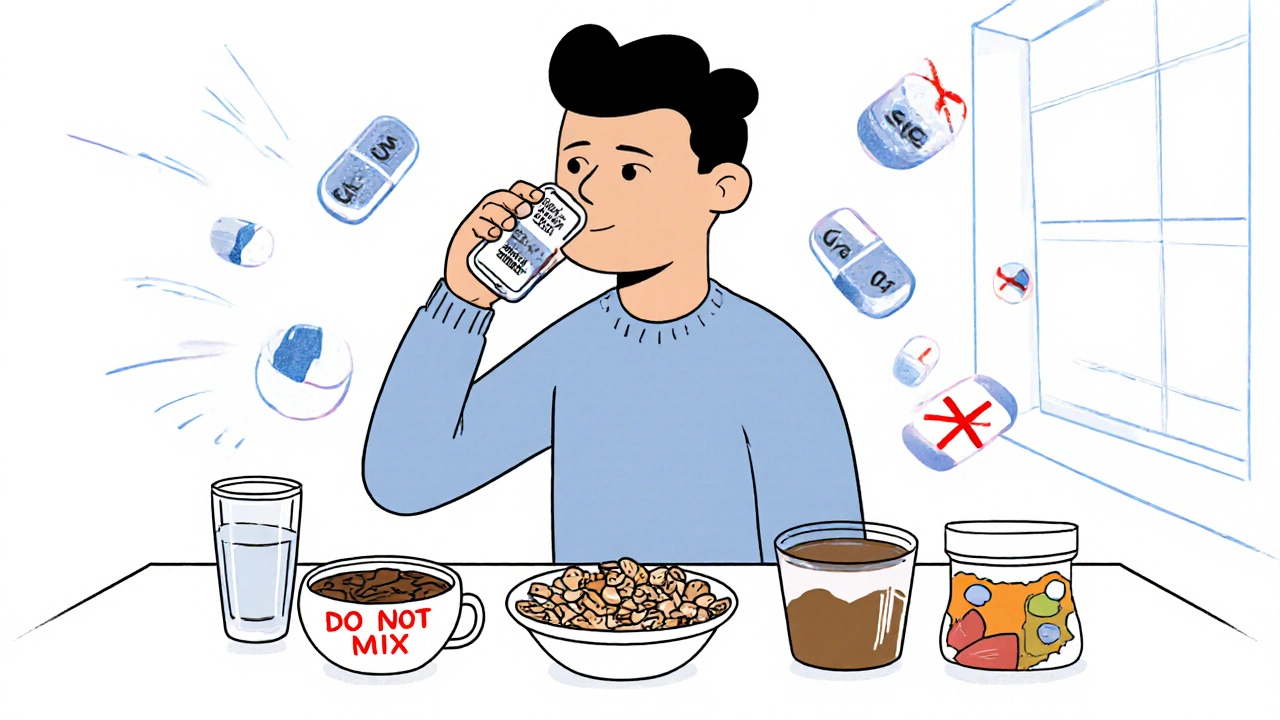
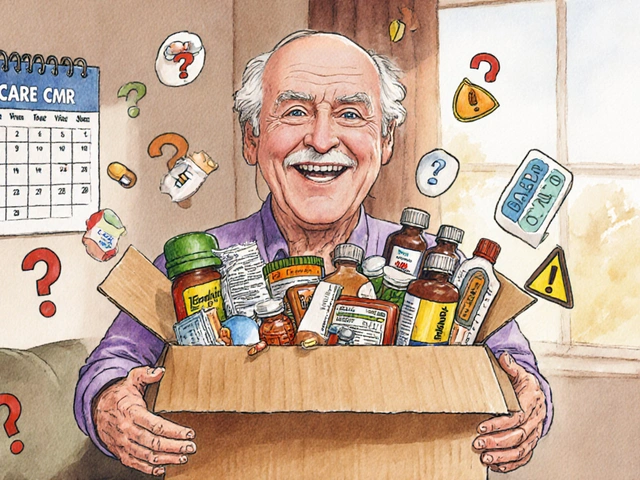
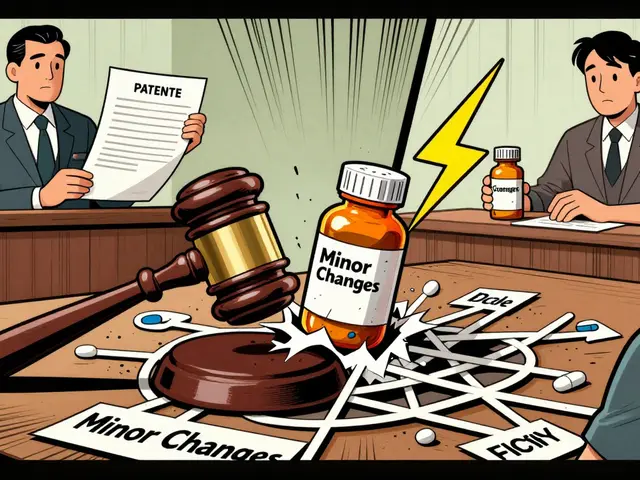
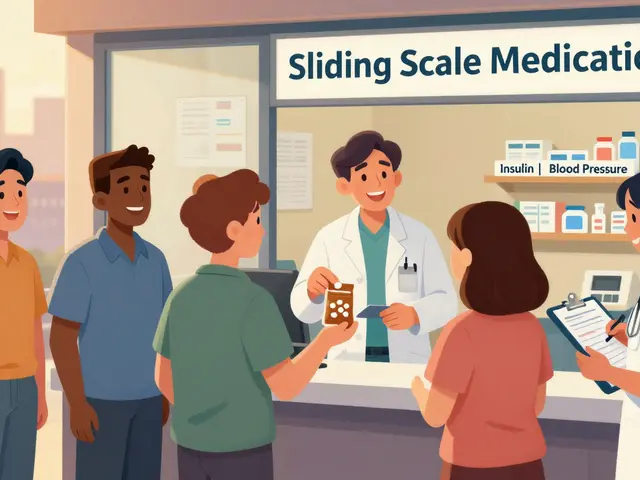
Neoma Geoghegan
Just took my Fosamax at 6am with water. Waited 60 mins. Calcium at 7:15. No more guesswork. Bones are thankin' me.
Bartholemy Tuite
Bro i been takin my alendronate with my coffee n yogurt for 4 years like its normal lmao. Just found out i was basically swallowin sugar pills. My hip bone density is still trash. Time to switch to the yearly iv shot. No more alarm clocks n strict water rules. Fuck timing.
Sam Jepsen
This is the most useful post i've read in months. Seriously. I thought calcium was just 'good for bones' so i took it with my pill. No wonder my doctor kept saying 'it's not working'. I'm resetting my whole routine today. 6am water only. 7:30 calcium. No excuses. Thanks for the clarity.
Yvonne Franklin
Vitamin D is non negotiable. If your levels are below 30 you're wasting your time. Get tested. Supplement if needed. No exceptions.
Jessica Correa
I never realized my multivitamin had calcium in it. I took it with my pill every morning. No wonder nothing changed. I'm switching to a vitamin D only supplement now. And yes i'm setting two alarms. One for the pill one for the calcium. I'm done with fractures.
manish chaturvedi
In India, many patients consume calcium-rich foods such as curd and milk with breakfast. The cultural habit of consuming dairy early in the morning makes adherence to the protocol difficult. Perhaps community health workers could provide visual guides or audio reminders in local languages to improve compliance.
Nikhil Chaurasia
I used to take my bisphosphonate at night because I forgot in the morning. Then I broke my wrist. Then my hip. Then I realized it wasn't the bone density. It was my stupidity. I switched to Reclast. One shot. One year. No more panic. No more alarms. Just peace. I wish I'd done this sooner.
Holly Schumacher
Of course calcium interferes. It's basic chemistry. Anyone who doesn't know this shouldn't be taking prescription meds without a pharmacist holding their hand. I'm shocked this even needs to be explained. You're not a toddler. Don't treat your bones like a toddler's bedtime snack.
Michael Fitzpatrick
I used to think the 30 minute rule was just a suggestion. Like, maybe 20 minutes is fine if I'm in a rush. Spoiler: it's not. I took my pill at 6:30, had my yogurt at 6:50, and my bone density dropped again. My doctor looked at me like I'd just admitted to stealing his lunch. I switched to IV. No more guilt. No more 'maybe'. Just a 15 minute appointment once a year. Life changed. Seriously. Don't wait for a fracture to get smart.
Shawn Daughhetee
my pharmacist printed me a little card with the schedule. 6am water only. 7am breakfast. 8am calcium. i taped it to my fridge. i still forget sometimes. but now i know. and i dont feel dumb when i mess up. just human.
Justin Daniel
so you're telling me i could've avoided 3 fractures if i'd just waited an hour? wow. that's not a medical issue. that's a system failure. why aren't pharmacies giving out these schedules like they do for insulin? why is this on us to figure out? anyway. i'm switching to Prolia. no more guessing. no more panic. just a shot every six months. peace.
New Yorkers
You people are so desperate for quick fixes you'll swallow a pill with your oatmeal and call it 'self-care'. The system is broken. The drugs are outdated. The doctors are overworked. The pharmacists are understaffed. And you? You're still wondering why your bones are crumbling. It's not the calcium. It's the culture. You want a miracle? Stop treating your body like a vending machine.
David Cunningham
Just switched to Reclast last year. No alarms. No fasting. No water rules. Just show up once a year, get the drip, go home, feel a bit under the weather for a day, then forget about it. Best decision I ever made. My doctor said I'm now in the top 5% of adherence. I didn't even know that was a thing. Turns out, being lazy can be smart.
luke young
my mom did the 6am pill 7am calcium thing for 2 years. no fractures. no panic. just quiet consistency. she says the hardest part was remembering to drink the whole glass of water. not the timing. so drink the water. that's step one.